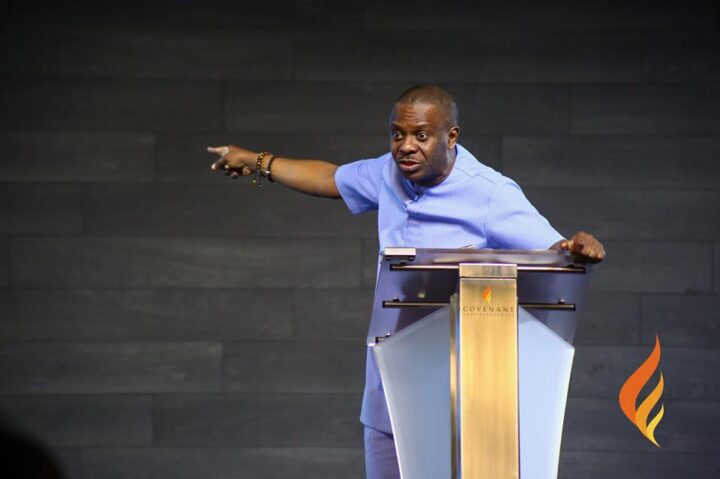For a few months now, I have had this question on my mind and I have been about the business of seeking answers to it; did Jesus die for good governance? Yes? No? Maybe? Or do you think it is really none of God’s business to allow good governance reign among men and women of this age?
This past weekend, and of course this Monday, was for the remembrance of the death, and the celebration of the resurrection of Jesus Christ — the author and the finisher of the Christian faith. So, a friend, whom I once asked the same question, suggested this would be a good time to discuss this issue and present my findings while listening to what everyone else thinks about God and governance.
Tunde Bakare, Poju Oyemade, Sam Adeyemi, Yemi Osinbajo, Ejike Mbaka, Matthew Kukah, John Onaiyekan, are perhaps top on the list of Christian teachers, who have been prominent on the Nigerian political scene, either as active teachers and active participants in the business of politics.
For almost two decades now, I have followed Tunde Bakare, the serving overseer of the Latter Rain Assembly, as he pushes for the participation of Christians in politics, a message he himself lived when he joined Muhammadu Buhari on the campaign train in 2011. Before then, Bakare had led a group called Arrow Heads, which included Oby Ezekwesili, Ngozi Okonjo-Iweala, Donald Duke, Nasir El-Rufai, Nuhu Ribadu, Fola Adeola, Jimi Lawal, Yinka Odumakin, Jimi Agbaje, Wale Osun and a number of today’s prominent figures. He has also spoken truth to power; to Sani Abacha, MKO Abiola, Olusegun Obasanjo (who, by the way, ensured the SSS arrested him in the early 2000s), to Goodluck Jonathan and now Muhammadu Buhari.
Advertisement
Poju Oyemade, the senior pastor of the Covenant Christian Centre, started a national dialogue for good governance and national development 11 years ago — and called it The Platform. In his words, “The Platform simply has the prophetic function of preservation” — I will get to this later on. The Platform “saw” Yemi Osinbajo, long before he became a household name.
Sam Adeyemi, the senior pastor of Daystar Christian Centre, has been passionate about leadership since I first heard of him, about a decade ago, till date. His Excellence in Leadership Conference was the first place I heard Yemi Osinbajo speak, and those words resonate with me to date.
Time will not permit me to speak of Kukah, Onaiyekan, Mbaka, and a host of other Christian leaders who have strong voices in Nigeria’s political landscape. I would head straight to explain my thoughts on what I think about God and governance.
Advertisement
IS GOD INTERESTED IN GOVERNANCE?
“For the LORD is our Judge, The LORD is our Lawgiver, The LORD is our King; He will save us”. This is the description of God according to the prophet Isaiah. Here, we see God in the judiciary (the judge), we see him in as the legislator (the lawgiver), and as the president (the king). So long before democracy became the order, God has laid out an example, showing that he is interested in the rule of law, and the leadership of men.
The book of Proverbs, one of the 66 books in the Bible says in its 29th chapter: “when the righteous are in authority, the people rejoice; But when a wicked man rules, the people groan“. Also suggesting that God is interested in governance and of course, in righteous rule. King Nebuchadnezzar of Babylon (605 BC – 562 BC), who had the longest and most powerful reign of any monarch in the neo-Babylonian empire, in one of his confessions said “the Most High rules in the kingdom of men, Gives it to whomever He will, And sets over it [even] the lowest of men”.
The character of God shows that God is particularly interested in public health, security, and order. And we know that everything rises or falls on the basis of governance. Logic definitely shows that God is interested in governance. Ultimately, Paul’s letter to the Church in Rome revealed that one of the spiritual gifts of God to man is the ability to lead or govern well. So, I dare say God is interested in governance.
DID JESUS DIE FOR GOOD GOVERNANCE?
It may not be easy to conclude on the reality of Jesus dying for good governance. But every Christian may easily agree on other things Jesus died for. So, what did Jesus die for? There is an easy consensus among Christians that Jesus died for the Redemption of mankind; to reconcile man to God.
Advertisement
Hence, the big question; Is good governance part of the redemption work Jesus did?
God has a pattern, and the devil has his; God’s pattern is to build, the devil’s way is to destroy; God brings light, the devil ensures darkness. At creation, God said “let there be light, and there was light”, after which he began to create the world and put things in order.
As man fell, man lost the absolute order God had put in place, and was in dire need of reconciliation and redemption, which Jesus came to give by his death and resurrection. His plan was to create or “make men” who have come to be called Christians, known as the light and salt of the earth. As we see in God’s pattern, light comes before creation, and after creation, salt is needed for preservation. So Jesus’ work was to restore light and ensure the continued presence of salt, all necessary for good governance.
Poju Oyemade argues, and I agree, that “God does his work based on compassion”. “Will God ignore the pain of a woman who lost her baby while giving birth because of a lack of proper infrastructure at the hospital? Will God ignore the anguish of a medical doctor who knows how to save a life, but the lack of proper infrastructure makes him lose that patient? Will God ignore the pain of a family who lost their breadwinner, and the children are now struggling because their father died due to a road accident caused by a pothole that could have been easily avoided?”
Advertisement
I do not think God would ignore this. Jesus came not just to win souls but to seek and save that which was lost; good governance was lost on the earth, and He died also to restore this. So in the spirit of this season, we are all reminded that Jesus also wants to see good governance in Nigeria. His death was for this too.
What are your thoughts?
Advertisement
Follow Tijani on Twitter and across major social media platforms @OluwamayowaTJ
Advertisement
2 comments








Governance is a product of the people. Government does not come from mars. It’s from among us. Jesus died that we might be saved and then have access to becoming better people. Better people lead to better government. When Jesus was told of those who died from the collapsed tower, he adviced the people to repent or be befallen with worse. Jesus placed premium on good behaviour. In Nigeria we have attempted to have good governance conversations which absolve citizens of good behaviour. Listen to all the public letters statements etc. Onaiyekan, bakare, kukah, etc. None written to Nigerians to change their ways and shun the millions of acts of daily indiscipline whichthe contribute to destroy our nation. All their letters directed at government because their either blindsided or seeking popularity. May God help us to see that the good governance we seek starts with obeying Jesus in our daily lives and affecting our families, community and nation.
Spot on! He really died to restore the lost order. However, we have our parts to play in cooperating with Him to ensure this restoration becomes our reality. Faith without works is dead. Bad governance might be sustained by relying on Jesus for good governance with no sense of patriotism and while still indulging in corruption.